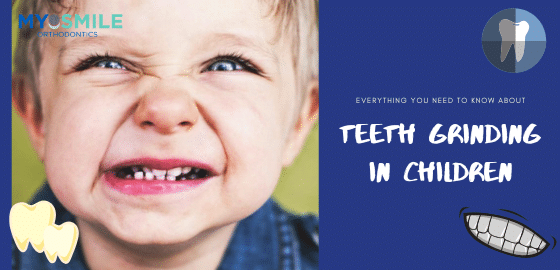
Everything You Need to Know About Teeth Grinding in Children
Teeth grinding is a common problem many children experience in their sleep. Bruxism, the medical term for grinding of the teeth or clenching the jaw, is found in 2-3 of every 10 children. The good news is that most children outgrow it. For those that don’t, there are treatment options to stop the problem before it does damage. Let’s take a closer look at teeth grinding in children and what you should know.
What Is Bruxism?
When you think of a sleeping child, you probably imagine a peaceful scene. While most parents bask in the sounds of sweet dreams, some aren’t that lucky. If your child experience teeth grinding you can actually hear it while they sleep. Bruxism generally happens during the deep sleep phases.
Experts aren’t always able to pinpoint the cause of bruxism, but many cases are related to stress. Emotional and/or physical stress can easily cause a person to grind their teeth. Teeth grinding may be a response to pain, such as a toothache. Children can grind their teeth as a way to ease the pain.
Tension or anger can also be the cause. If a child is worried about something in their life, they may grind their teeth or clench their jaw as a reaction to how they feel. If your child experiences teeth grinding, take a look at any lifestyle changes they may have experienced. Are they stressed out about school? Is there a change in their routine? Has your family structure or housing changed?
Orthodontic issues can also be a cause of bruxism. When the top and bottom teeth aren’t aligned properly, it may lead to bruxism. Finally, children who are hyperactive or have medical conditions can experience this issue. Certain medications for chronic illness can lead to bruxism. And medical conditions such as epilepsy or cerebral palsy can cause a child to develop bruxism.
The Effects of Teeth Grinding
Many cases of teeth grinding go undetected. They may require no treatment at all. Some individuals will even see that their issue resolved itself. On the other hand, severe cases of bruxism or cases where bruxism has effects on the body are also common. The effects of bruxism can be headaches or earaches.
Children can also experience the following dental effects:
- Worn down tooth enamel
- Chipped or broken teeth
- Increase sensitivity to temperature changes
- Jaw problems
- Severe facial pain
- TMJ
How to Diagnose and Treat Teeth Grinding
Most patients who grind their teeth don’t even know they are doing it. It’s usually another individual who points out the issue. For children, it’s most commonly a parent or a sibling. If you’re worried that your child might be teeth grinding, watch for these signs:
- Grinding noises during sleep
- Waking up with a sore jaw
- Facial pain after sleep
- Pain with chewing
The first course of action to treat this problem is to see your child’s orthodontist or dentist. They’ll examine your child’s teeth to check for wear and tear signs of teeth grinding. If there are signs of this issue, your child’s dental provider may ask some questions to try to determine the cause. Common questions include:
- How do you feel about bedtime?
- Are you worried about anything in school or at home?
- Is something bothering you?
- Are you angry with someone?
- What do you do before you go to bed?
- How do you feel before you go to bed?
The answers to these questions can determine whether your child’s condition is related to stress or a misalignment of the teeth. Determining the cause is the first step in treating the issue.
Treating Bruxism
Since most children outgrow this condition, it may not be necessary to provide treatment at all. You may be instructed to keep a close eye on your child’s condition. You may also be required to visit the dentist or orthodontist more frequently to monitor the issue.
If your child experiences pain or issues with a sore jaw and teeth, or your dentist notices damage as a result of teeth grinding, further treatment may be necessary. The most common treatment for this issue is a special mouth guard that is used at night. Your child will be fitted for a custom night guard. It’s similar to a protective mouthpiece worn during sports.
Your child may also benefit from increased relaxation techniques if the cause is stress. Taking a warm bath before bed, reading a book, or listening to relaxing music may be helpful for your child to relax. You can also talk to a professional to find other ways to help your child handle their stress.
Many children will stop teeth grinding when they lose all their baby teeth. Since some cases of bruxism are a reaction to stress, the condition can also be prevented. Talk to your children regularly about their feelings. Deal with potentially stressful situations with extra care and concern. Help your children cope with difficult times.
As always, you should keep a regular schedule for dental visits with your children. This can help detect early signs of bruxism and treat the condition before it becomes a habit. If your child’s mouth alignment is the cause of teeth grinding, speak to an orthodontist about correcting the problem. Teeth grinding is common and easily treatable.
Remember, we’re always here to help you with any concerns you have about your child’s dental health! Get in touch with us if you think your child is having issues with grinding their teeth or clenching their jaw.
